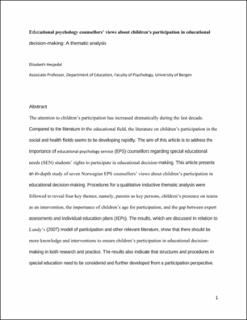Educational psychology counsellors’ views about children’s participation in educational decision-making: A thematic analysis
Journal article, Peer reviewed
Accepted version
Permanent lenke
https://hdl.handle.net/11250/2992187Utgivelsesdato
2021Metadata
Vis full innførselSamlinger
- Department of Education [300]
- Registrations from Cristin [9791]
Originalversjon
The International Journal of Children's Rights. 2021, 29 (3), 640-661. 10.1163/15718182-29030005Sammendrag
The attention to children’s participation has increased dramatically during the last decade. Compared to the literature in the educational field, the literature on children’s participation in the social and health fields seems to be developing rapidly. The aim of this article is to address the importance of educational psychology service (eps) counsellors regarding special educational needs (sen) students’ rights to participate in educational decision-making. This article presents an in-depth study of seven Norwegian eps counsellors’ views about children’s participation in educational decision-making. Procedures for a qualitative inductive thematic analysis were followed to reveal four key themes, namely: parents as key persons; children’s presence on teams as an intervention; the importance of children’s age for participation; and the gap between expert assessments and individual education plans (iep s). The results, which are discussed in relation to Lundy’s (2007) model of participation and other relevant literature, show that there should be more knowledge and interventions to ensure children’s participation in educational decision-making in both research and practice. The results also indicate that structures and procedures in special education need to be considered and further developed from a participation perspective.
